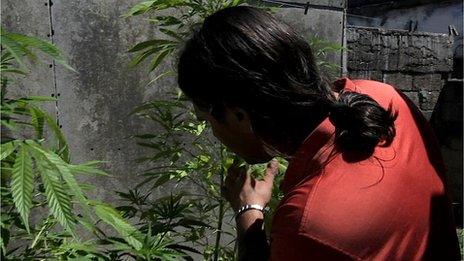Uruguay bill pioneers state control of cannabis market
- Published

Cristian decided to grow his own marijuana last year
Cristian, a 32-year-old blacksmith from Uruguay, grows five cannabis plants with care and dedication in the back yard of his workshop on the outskirts of Montevideo.
"I have been smoking three or four joints a day since I was 13," he says.
"But last year I decided to grow my own cannabis because the quality of the marijuana at the boca (hotspots where illegal drugs are sold) is too low, or it comes mixed with hard and dangerous drugs, like cocaine paste," he says.
Every morning Cristian checks his plants have the appropriate amount of light, fertiliser and insecticide.
But above all, he always makes sure they are well hidden from the police and out of the neighbours' sight.
State control
For decades, smoking cannabis has been legal in this South American country.
Seeing a group of youngsters sharing a joint in the park has become a familiar scene, but growing and buying the drug have remained illegal.
But that is about to change.
Uruguay is set to become the first nation in the world to regulate the production, sale and consumption of cannabis after a new law was passed by the country's senate on Tuesday.
Once the president signs the bill, the state will control the production and sale of cannabis.
For Cristian, this will mean that instead of hiding his plants from the police, the authorities will supervise them to make sure he complies with the new rules.
.jpg)
It is not unusual to see people smoking cannabis in Uruguay
A central body, the National Institute for Cannabis Regulation, will provide those who want to grow marijuana with seeds and ensure that their crop does not exceed the legal limit of 480g (1lb 1oz) per year.
Cristian welcomes the change.
"I think it was about time that cannabis became legal. Police should worry about fighting crime and drug trafficking, not me," he says.
'No weed-for-all'
The man behind the law is 78-year-old former guerrilla fighter turned President Jose Mujica.
The president says he opposes drug consumption but wants to take the multi-million-dollar cannabis business away from the drug cartels.
"This won't be a weed-for-all country," Mr Mujica assured critics.
Under the new law, buyers will have to officially register - something only residents can do, not tourists.
There will also be a strict 40g/month limit on those who grow the drug or buy it at licensed pharmacies.
"What I am doing is offering consumers a legal amount," President Mujica explains.
Global first
The bill goes several steps further than existing legislation in the Netherlands, where growing cannabis is not legal, although the authorities turn a blind eye to those who grow some plants at home.
It bears some similarities to drug laws in the US states of Colorado and Washington, where the sale of cannabis for medicinal or recreational use was made legal in 2012.
But Uruguay is the first nation state to regulate the production, distribution and sale of the drug.
The country, which has a population of fewer than 3.5 million people, has so far been spared much of the drug-related violence that other Latin American countries have suffered from, but officials say it is time to tackle drug gangs before they get too strong.
"Last year, 82 people were killed in drug-related violence in Uruguay. We are starting to see episodes of criminal score-settling, groups of hitmen ... but we are not aware of anybody who died because of marijuana consumption," explains the head of the National Drug Agency, Julio Calzada.
'Visionary'
Other Latin American countries are watching Uruguay's experiment with interest.

President Mujica has been called "a visionary" for promoting the law
Guatemalan President Otto Perez Molina, whose country is suffering from a wave of violence blamed on drug cartels, has described his Uruguayan counterpart as "a visionary".
Others view Mr Mujica's experiment with scepticism.
Mexican Foreign Minister Jose Antonio Meade recently warned that "unilateral policies" would not solve the problem, and asked for a global discussion about drug policy.
Uruguay's neighbour Brazil sent a delegation to Montevideo earlier this year to express its concern about the potential impact of the new law.
But Mr Calzada insists Uruguay's neighbours will benefit as well as its own citizens.
"Our commitment to other countries is that our legal marijuana will not end up smuggled into their territory. This will not happen," he assures foreign sceptics.
Opposition
But the law is also facing criticism at home. According to recent polls, 60% of Uruguayans oppose the bill.
Congresswoman Veronica Alonso of the National Party is one of them.
"This law does not solve the real problems. If the government really wants to fight insecurity it should tackle the places where illegal drugs are sold," she told the BBC.
"If it is a matter of public health, then it should work to prevent the consumption of other drugs, like tobacco or alcohol," she argues.
Ms Alonso fears that the law will encourage drug consumption, especially among young Uruguayans.
"There will be a higher availability of marijuana and at the same time the perception of marijuana as a dangerous drug will be lower. Therefore consumption will grow," she says.
"This is going to cause us a lot of problems, especially from a social and medical point of view, and the State is not ready to face them."
Whether good or bad, the effects of the government's pioneering move are certain to be scrutinised and analysed by both opponents and supporters of cannabis legalisation not just in Uruguay but across the world.
- Published9 August 2013
- Published1 August 2013
- Published1 August 2013